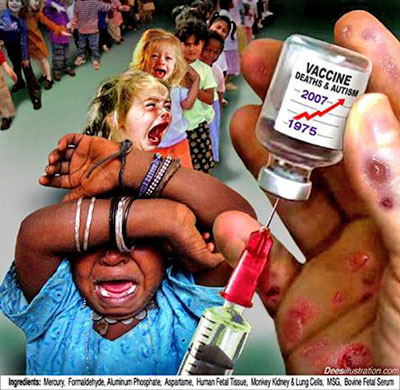|

by David Noble
January 26, 2012
from
EndTheLie Website
In April 2009, the first case of
swine
influenza in humans was reported in Mexico.
Two months later, the World Health
Organization (WHO) declared it a pandemic. This was the start of
a scandal which led to countries competing with one another to get
the most vaccines as quickly as possible, spending unbelievable sums
of public money to acquire vaccines that were two to three times
more expensive than other vaccines.
With health authorities like the WHO and the European Centre for
Disease Prevention and Control (ECDC) fuelling hysteria,
countries panicked taking steps that were disproportionate to the
known and experienced severity of the H1N1 epidemic.

The costs
according to the latest Court of Auditors report were close to 1.3
billion Euros in the United Kingdom and over 700 million Euros in
France.
The exception to the panic buying of these H1N1 vaccines was Poland
whose government decided against vaccinating the population. Yet
despite the well-publicized supposed threat their mortality rate was
not higher than in countries whose population was vaccinated.
By the end of April 2010 it became clear that despite all the fear
mongering and huge costs to countries who were already trying to
cope with crippling debt that this Flu had a much lower mortality
rate than that related to seasonal flu.
With around 2 900 deaths in Europe
attributed to H1N1 compared to an estimated 40 000 - 220 000 deaths
per year depending on the year that related to seasonal flu.
This
'unbelievably' was not picked up by
the main stream media who
continued to play up the severity of the threat.
It also wasn’t long before health concerns about the vaccine started
to emerge with cases of Narcolepsy being reported in children in
Finland and Sweden following vaccinations with GSK’s H1N1 influenza
vaccine.
These concerns were highlighted by
Michèle Rivasi on the 7 March 2011 in Strasbourg during an
evaluation of the management of H1N1 influenza in the EU in
2009-2010 when she stated,
“I would like to highlight the cases
of
Narcolepsy that have been reported in children in Finland
and Sweden following vaccination with GSK’s H1N1 influenza
vaccine.
These cases need our attention. In
the first instance, they clearly demonstrate that there are
still grey areas, both in relation to the actual toxicity of the
vaccines and adjuvants and in relation to possible risks as yet
unknown to the manufacturers themselves.
Finland has suspended
the use of this vaccine until more information is available.
This is not the position of the
European Medicines Agency (EMA), which has decided instead
to wait until more information is available before issuing any
opinion on restricting the use of this vaccine. I would like to
see the Commission adopt the same position as Finland.
It is time that the precautionary
principle benefited patients for once instead of always
benefiting the companies”.
What’s really worrying about this
vaccine is that the vaccine manufacturer, despite making huge
profits, refused to take responsibility for the vaccine’s side
effects.
Did they know something that they
weren’t sharing about the safety of their vaccine?
This certainly seems to have been the case as scientists involved in
creating previous vaccinations were telling family and friends not
to take the H1N1 vaccine:
What is even more alarming is that it seems that most health care
workers don’t trust these vaccines either.
The Journal of General
internal Medicine
reported in February 2006 that 70% of doctors and
62% of healthcare workers DO NOT take flu shots. Yet these same
health professionals urge the rest of us to get vaccinated.
Some Doctors have spoken out against the dangers of vaccines as can
be seen from the video below:
|

